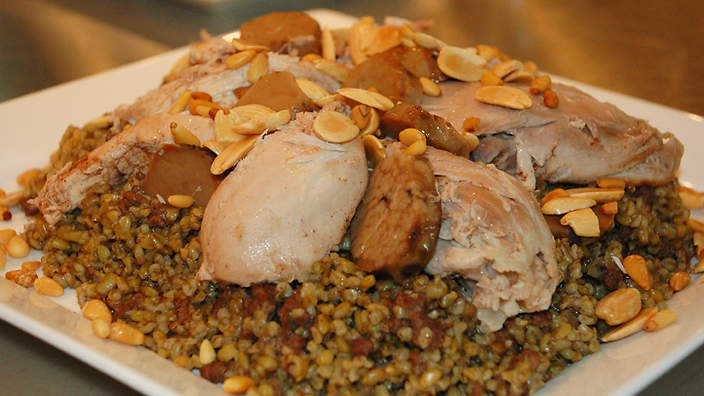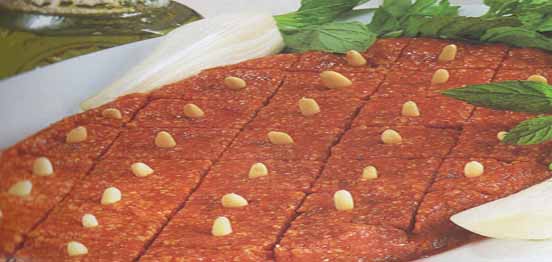|
Syrian cuisine is a diffusion of the cultures of civilizations that settled in Syria, particularly during and after the Islamic era beginning with the Arab Umayyad conquest, then the eventual Persian-influenced Abbasids and ending with the strong influences of Turkish cuisine, resulting from the coming of the Ottoman Turks. It is in many ways similar to other (Greater Syria) Levantine cuisines, mainly Lebanese, Palestinian, Jordanian and Iraqi.
Syrian cuisine includes dishes like kibbeh, kebab halabi, waraq `inab, hummus, tabbouleh, fattoush, labneh, shawarma, mujaddara, shanklish, bastirma, sujuk and baklava. Syrians often serve selections of appetizers, known as "meze", before the main course, and za`atar, minced beef, and cheese manaqish as hors d'oeuvres. Arabic flat bread is always eaten together with meze. Syrians also make cookies called "ka`ak", to usually accompany their cheese. These are made of farina and other ingredients, rolled out, shaped into rings and baked. Another form of a similar cookie is to fill with crushed dates mixed with butter to eat with their jibbneh mashallale[clarification needed], a string cheese made of curd cheese pulled and twisted together. A spice mixture called "baharat mushakalah" is endemic to Syrian cuisine. Vine leaves There are two types of stuffed vine leaves in Syria:
Kebab khashkhash from Aleppo. Kebab Halabi (كباب حلبي / kibāb Ḥalabī) is a kind of kebab served with a spicy tomato sauce and Aleppo pepper, very common in Syria and Lebanon, named after the city of Aleppo (Ḥalab). Kebab Halabi has around 26 variants, including:
Kibbeh. A variety of Syrian dishes made with bulgur and minced lamb are called "kibbeh" (كِبّة / kubbah). Aleppo is famous for having more than 17 different types of kibbeh.These include kibbeh prepared with sumac (كِبّة سمّاقية / kubbah summāqīyah), yogurt (كِبّة لبنية / kubbah labanīyah),quince (كِبّة سفرجلية / kubbah safarjalīyah), lemon juice (كِبّة حامض / kubbah ḥāmḍa), pomegranate sauce, cherry sauce, and other varieties, such as the "disk" kibbeh (kubbah qrāṣ), the "plate" kibbeh (كِبّة بالصينية / kubbah bi-aṣ-ṣīnīyah) and the raw kibbeh (كبة نية / kubbah nayyah). However, kibbeh Halab is an Iraqi version of kibbeh made with a rice crust and named after Aleppo. Mahshi Kusa mahshi. Mahshi (محشي / maḥshī) is a famous dish served in Syria. It is essentially zucchini (كوسا / kūsā) or eggplant (باذنجان / bādhinjān) stuffed with ground beef, rice and nuts. Street food Syrian street food includes:
Syrians are renowned for producing dried apricot paste (qamar ad-din).
Special edition of 5 years-aged Arak Al Hayat from Homs, Syria
|

Freekeh with chickenSimilar to the popular dish riz a’djaj (poached chicken served on rice), this recipe uses toasted freekeh wheat with its distinctive nutty taste. The wheat is cooked slowly like a risotto with chicken stock, minced meat, spices and onion until it is soft and flavoursome. The dish is then piled high onto a serving platter and served with poached chicken pieces, Syrian truffle (if available), pine nuts and almonds. Ingredients
InstructionsWash the freekeh and remove any burnt grains or stones.
Put the chicken in a pot and cover with water. Add the brown onion, cinnamon sticks, bay leaves, cardamom and 1 teaspoon of salt. Cover with a lid and bring to the boil. Simmer for 30 minutes or until cooked through. Remove the chicken from the pot (leaving a light stock) and set aside until cool enough to handle. Remove the skin and break the meat into large pieces, removing the bones. Bring the chicken stock back to a slow simmer. Heat the ghee or olive oil in a large saucepan and add the red onion. Fry until beginning to soften, then add the lamb or beef, if using, and cook until browned. Stir in the freekeh. Add the baharat and 1 heaped teaspoon of salt and stir through. Add 1 litre of hot chicken stock and bring to the boil. Lower the heat, cover and simmer for 40 minutes. Melt a little butter in a large frying pan over medium heat. Add the almonds and cook until lightly toasted. Remove from the pan and repeat with the pine nuts. Remove from the pan and add another knob of butter. When it melts, add the truffles, if using, and coat with butter. Add the chicken pieces, ground cinnamon and 500 ml of hot stock. Bring to the boil, reheating the chicken. Spoon the freekeh onto a large serving plate. Place the chicken and truffles on top and scatter with the nuts. Cook's notesOven temperatures are for conventional; if using fan-forced (convection), reduce the temperature by 20˚C. | We use Australian tablespoons and cups: 1 teaspoon equals 5 ml; 1 tablespoon equals 20 ml; 1 cup equals 250 ml. | All herbs are fresh (unless specified) and cups are lightly packed. | All vegetables are medium size and peeled, unless specified. | All eggs are 55-60 g, unless specified. Kibbeh bil saniehSyria’s national dish of minced meat and burghul is so deeply loved that over the years its fans have found many different ways to prepare it. The secret is using fresh, very finely minced meat. This is carefully spiced then served raw, baked or fried in endlessly varying shapes, often with delicious fillings (that often include more minced meat). This recipe is for a kind of kibbeh sandwich: a layer of cooked, spiced meat and pine nuts is pressed between two layers of fine kibbeh, then baked and served in wedges like pieces of cake. Serve with salad and drained yoghurt (natural yoghurt that has been drained in muslin until thick).
IngredientsFilling
Kibbeh
Instructions
Soaking time overnight You will need to begin this recipe 1 day ahead. For the kibbeh you need to soak the burghul in 250 ml of water overnight. The next day drain well. To make the filling, heat the oil in a frying pan over low heat and add the meat. Cook, stirring constantly to break up the grains of meat. When the meat is browned and separated and the moisture is starting to evaporate, stir in the onion, spices, salt and pepper and keep cooking until the onion is soft. Meanwhile, melt the butter in a small frying pan and add the pine nuts. Fry until they start to brown, then stir into the meat mixture. Remove from the heat and set aside to cool. To make the kibbeh, combine the drained burghul, meat, onion, baharat, salt and pepper in a bowl and mix well by hand until it forms a paste. You may need a little water to keep the mixture soft. Cover and leave to rest for 30 minutes. Preheat the oven to 180°C and oil a round baking tray with deep sides (around 2 cm). Dampen your hands and layer the tray with half of the kibbeh by forming small balls of the mixture then flattening them over the tray. Smooth the surface and make sure there are no gaps. Spread the cooled meat filling on top, pressing it down a little to keep the layers tight. Top with the rest of the kibbeh using the same technique. When the surface is smooth, push a small hole through the centre of the kibbeh with your finger. Slice into wedges fanning around the hole. Brush with the olive oil and bake in the oven for 25 minutes. |



